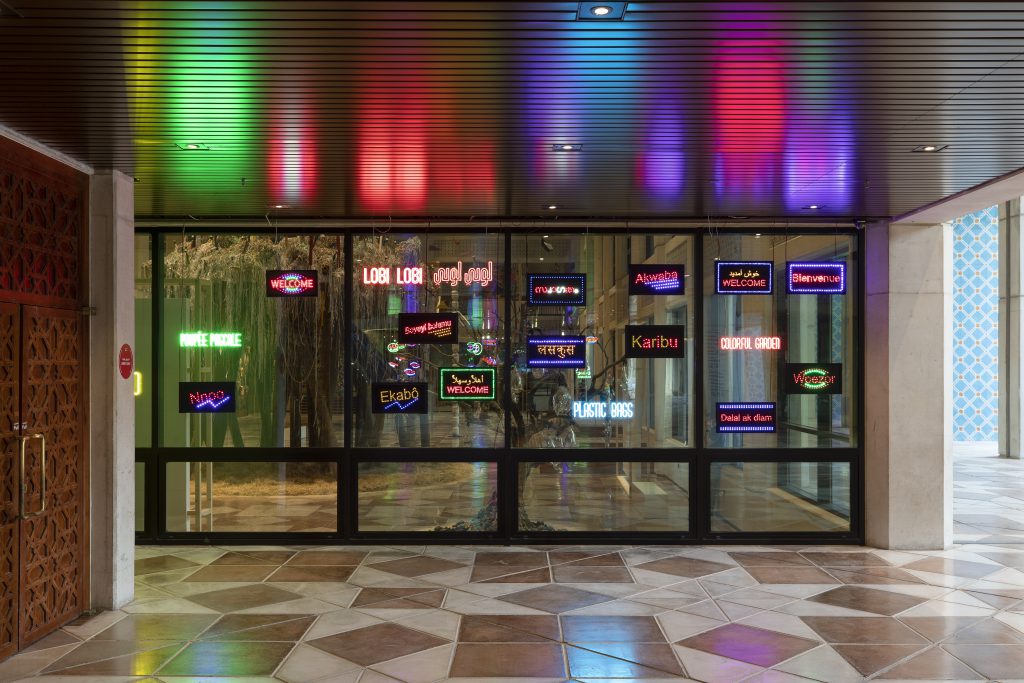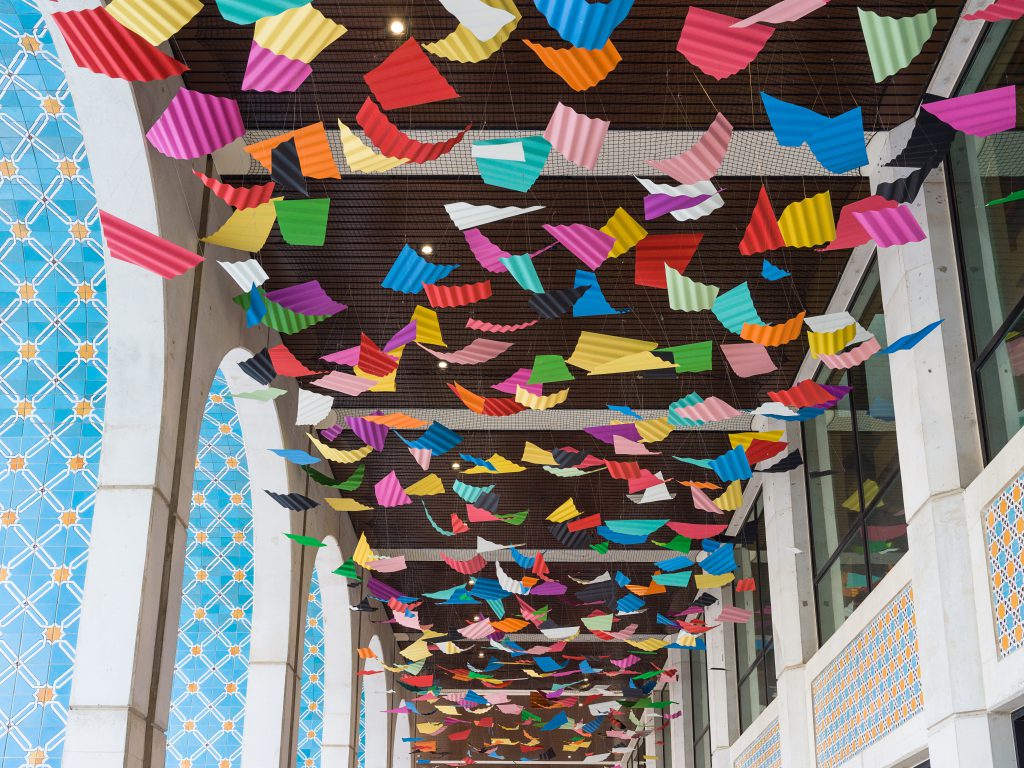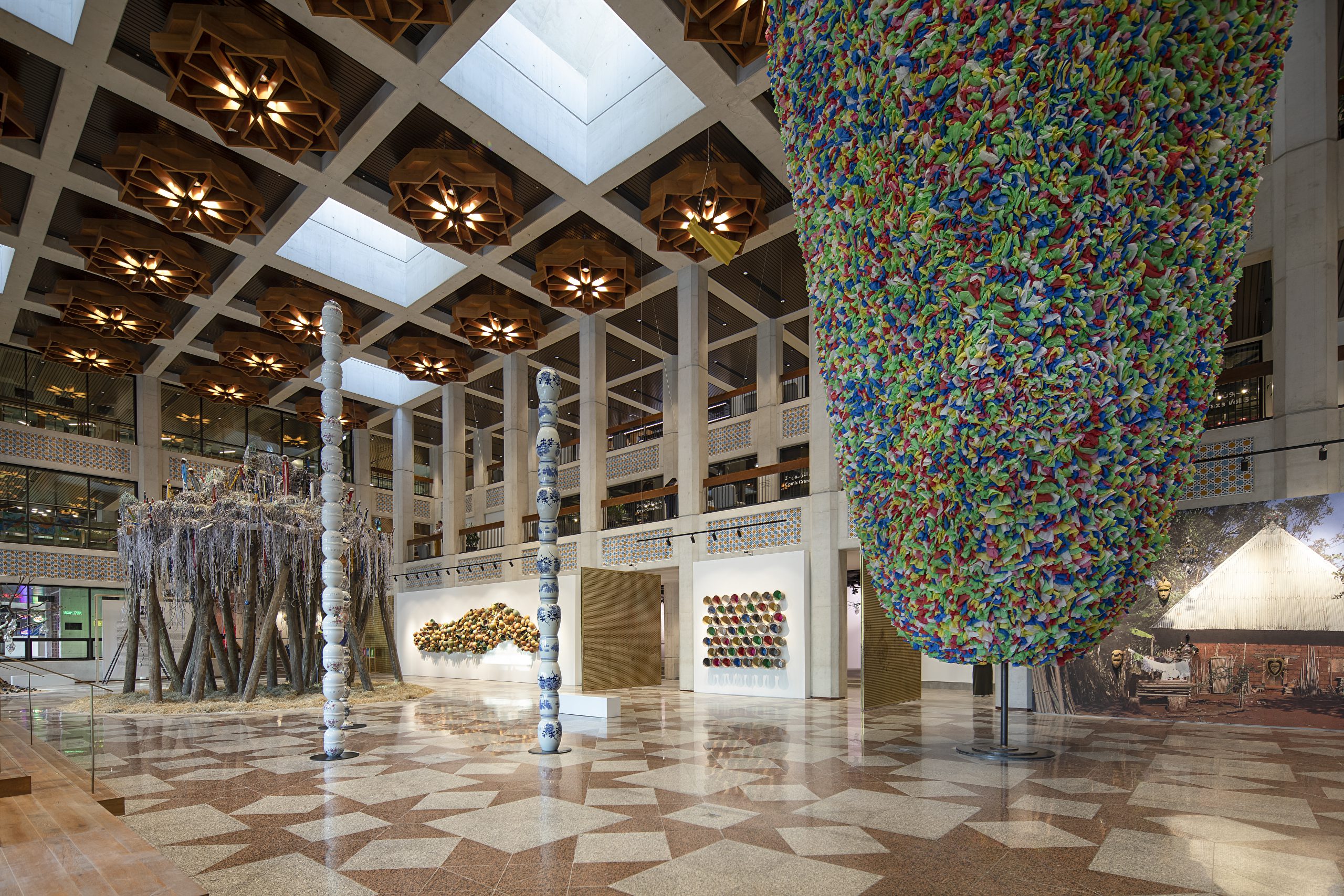Pascale Marthine Tayou confronts critical global issues through playful visuals in the artist’s first show in the United Arab Emirates at the Cultural Foundation in Abu Dhabi.
LOBI LOBI, Pascale Marthine Tayou’s first UAE exhibition is a generous one, filling the majority of the Abu Dhabi’s Cultural Foundation’s galleries, and does many things, including broaching issues of colonialism and migration, consumerism and waste. With tongue firmly in cheek, Tayou’s work also celebrates the complicated mixtures of backgrounds and identities in the postcolonial world through work that “defends the dream of remembering how to be a mix of everything, how to be creole,” Tayou says.
With one of the most quirky and irreverent creative sensibilities the Cultural Foundation has likely yet hosted, Tayou delights in contradiction. He abandoned the study of law to become “a maker – I don’t know what it is to be an artist, maybe one day I will be one.” He embraces mysticism and trades in aphorisms, cloaking it all in riotous colour and joyful assemblage.
Though the exhibition is not a retrospective, Tayou says, it presents a range of pieces from the past decade or so, some newly iterated for the Cultural Foundation. The main hall is dominated by Plastic Bags, an upside-down cone made of colourful plastic bags hung from the ceiling. For this exhibition, the sculpture became massive in scale, responding both to the huge space and to the contribution made by plastic waste to the climate crisis – as well, perhaps, to the heightened awareness of plastic use in a country that is set to host the 2023 United Nations Climate Change Conference (COP28) in Dubai later this year and is also planning a ban on single-use plastic bags in 2024.

Image courtesy of the Cultural Foundation, Department of Culture & Tourism – Abu Dhabi.
Organised in close collaboration with Tayou, LOBI LOBI is not a reflection of his career but of his attempt to “find a new way to express myself in what is new territory – the UAE – inspired by what Abu Dhabi is in my mind.” The exhibition takes its name from a poem he wrote in 2020, which opens:
“LOBI LOBI …
like a dream,
a dream mirror,
an opportunity for the possible,
it is the alphabet of forbidden writing.”
LOBI LOBI, Tayou says, means “yesterday, today and tomorrow”, a reflection of how the exhibition changed over the course of the discussion between the artist and the curators since 2019. But there are also pieces that reference the past, present and future – works that conjure colonialism, pieces like Plastic Bags that reflect on our current circumstances, as well as those that offer hope in the form of something that can’t be taken away, no matter what. Arbre de Vie (tree of life) is tucked into a corner of the cavernous main gallery, quite overshadowed by the show’s centrepieces. Traditional African masks rendered in crystal hang from the branches of a real tree about three metres high and no longer alive.
This is a particularly important work for Tayou because “it says a lot of what I want to say through my work, being both spiritual and social.” Deeply rooted in African traditions, a community tree is seen as a meeting place, but this is also a sculpture about mysticism, imagined as a “hotel for the spirits of the ancestors”, Tayou says. The shape of the masks represents the faces of all people, alive or dead. The masks’ materiality lets the living see the power of these magical objects. “Everyone can see themselves in the masks and experience spirituality in their own way.”
Although he often confronts difficult or painful topics, Tayou’s response is always multifaceted, always open. When he first made Plastic Bags, he was simply continuing his practice of using the items and objects that make up his environment. But by creating something aesthetically interesting, the viewer’s attention becomes focused. “I use plastic too. I don’t think I can change anything, but we have to find a way to talk about the issue.”

Image courtesy of the Cultural Foundation, Department of Culture & Tourism – Abu Dhabi © ADAGP, Paris
Some of Tayou’s ouvre is based in African tradition and his birthplace of Cameroon, and there are multiple works in the exhibition that explore facets of this. But he believes we are all a mix of identities. “The spices I have gathered from the places I have been make up the flavours of my work,” he explains. Tayou’s practice of mixing materials, particularly the natural with the manmade, is central to his work, but it is also unsettling. Home Sweet Home combines tree trunks with electric cables, the occasional computer mouse, and other manufactured objects into something that looks like a weeping willow, actual size. The tension created by placing such fundamentally different, even at-odds, items together feels almost dangerous, a bit like dark magic – perhaps because its power lies in the potentially difficult conversations that inevitably emerge, leading to the realisation that magic may be the only solution to our biggest collective problems.
But is magic something Tayou believes in? “I want my work to make people think about their own magic,” he concedes.
LOBI LOBI: Pascale Marthine Tayou runs until 26 November
Accompanying the main exhibition, BOBO LAND introduces young audiences to the world of Pascale Marthine Tayou through “Bobo” – the artist’s persona of a child as they dream, explore and create their future. The exhibition will encourage children and their families to engage with the works through interactive activations.
BOBO LAND: Pascale Marthine Tayou runs until 1 November



